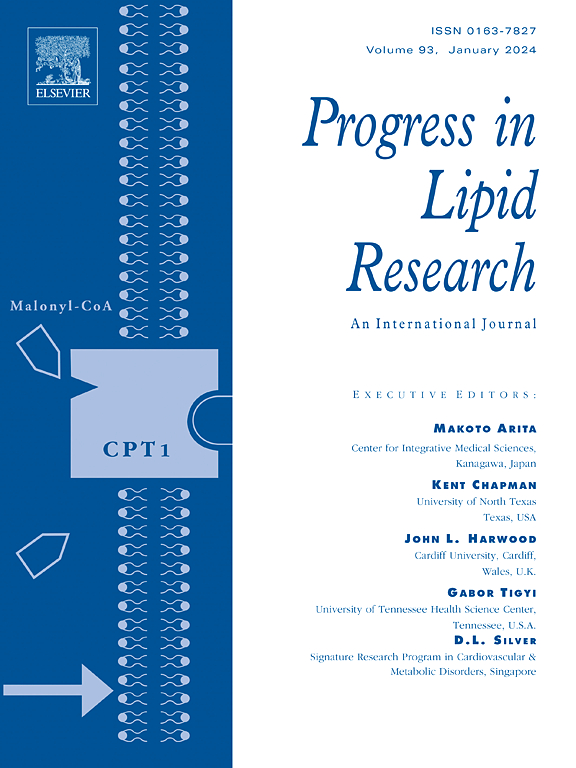油籽作物长链多不饱和脂肪酸的生物工程研究
IF 14.9
1区 医学
Q1 BIOCHEMISTRY & MOLECULAR BIOLOGY
引用次数: 0
摘要
长链多不饱和脂肪酸(LC-PUFAs),特别是甚长链多不饱和脂肪酸(VLC-PUFAs),对人类健康非常有益,包括大脑发育、心血管健康和免疫系统。植物性食用油是人类PUFAs的重要膳食来源。而油籽作物如大豆、花生、油菜籽、芝麻、亚麻等,其LC-PUFAs含量普遍不足,不会自然产生LC-PUFAs。本文综述了多聚脂肪酸生物合成、LC-PUFA生物工程在油籽作物中的研究进展,比较了不同基因工程策略的优势,并重点介绍了该领域遇到的瓶颈。来自不同物种的高效酶的组合使得LC-PUFAs的改善和vllc - pufas的少量生产成为可能,尽管存在世代不稳定的风险。在分子生物学、生物化学和植物生理学的多学科方法下,这些和未来智能设计的酶对于开发满足对LC-PUFAs日益增长的需求的油籽作物至关重要。本文章由计算机程序翻译,如有差异,请以英文原文为准。
Bioengineering of long-chain polyunsaturated fatty acids in oilseed crops
Long-chain polyunsaturated fatty acids (LC-PUFAs), especially very long-chain polyunsaturated fatty acids (VLC-PUFAs), are highly beneficial to human health including brain development, cardiovascular health and the immune system. Plant-derived edible oils serve as crucial dietary sources of PUFAs for humans. However, oilseed crops such as soybean, peanut, rapeseed, sesame and flax, generally contain insufficient content of LC-PUFAs and do not naturally produce VLC-PUFAs. This review discusses PUFA biosynthesis, current efforts on LC-PUFA bioengineering in oilseed crops, comparing the advantages of different genetic engineering strategies and highlights the bottlenecks encountered in this field. Combination of high-efficient enzymes from various species has enabled the improvement of LC-PUFAs and slight production of VLC-PUFAs, though under risk of generational instability. These and future intelligently designed enzymes with multidisciplinary approaches in molecular biology, biochemistry and plant physiology can be crucial in developing oilseed crops that meet the growing demand for LC-PUFAs.
求助全文
通过发布文献求助,成功后即可免费获取论文全文。
去求助
来源期刊

Progress in lipid research
生物-生化与分子生物学
CiteScore
24.50
自引率
2.20%
发文量
37
审稿时长
14.6 weeks
期刊介绍:
The significance of lipids as a fundamental category of biological compounds has been widely acknowledged. The utilization of our understanding in the fields of biochemistry, chemistry, and physiology of lipids has continued to grow in biotechnology, the fats and oils industry, and medicine. Moreover, new aspects such as lipid biophysics, particularly related to membranes and lipoproteins, as well as basic research and applications of liposomes, have emerged. To keep up with these advancements, there is a need for a journal that can evaluate recent progress in specific areas and provide a historical perspective on current research. Progress in Lipid Research serves this purpose.
 求助内容:
求助内容: 应助结果提醒方式:
应助结果提醒方式:


